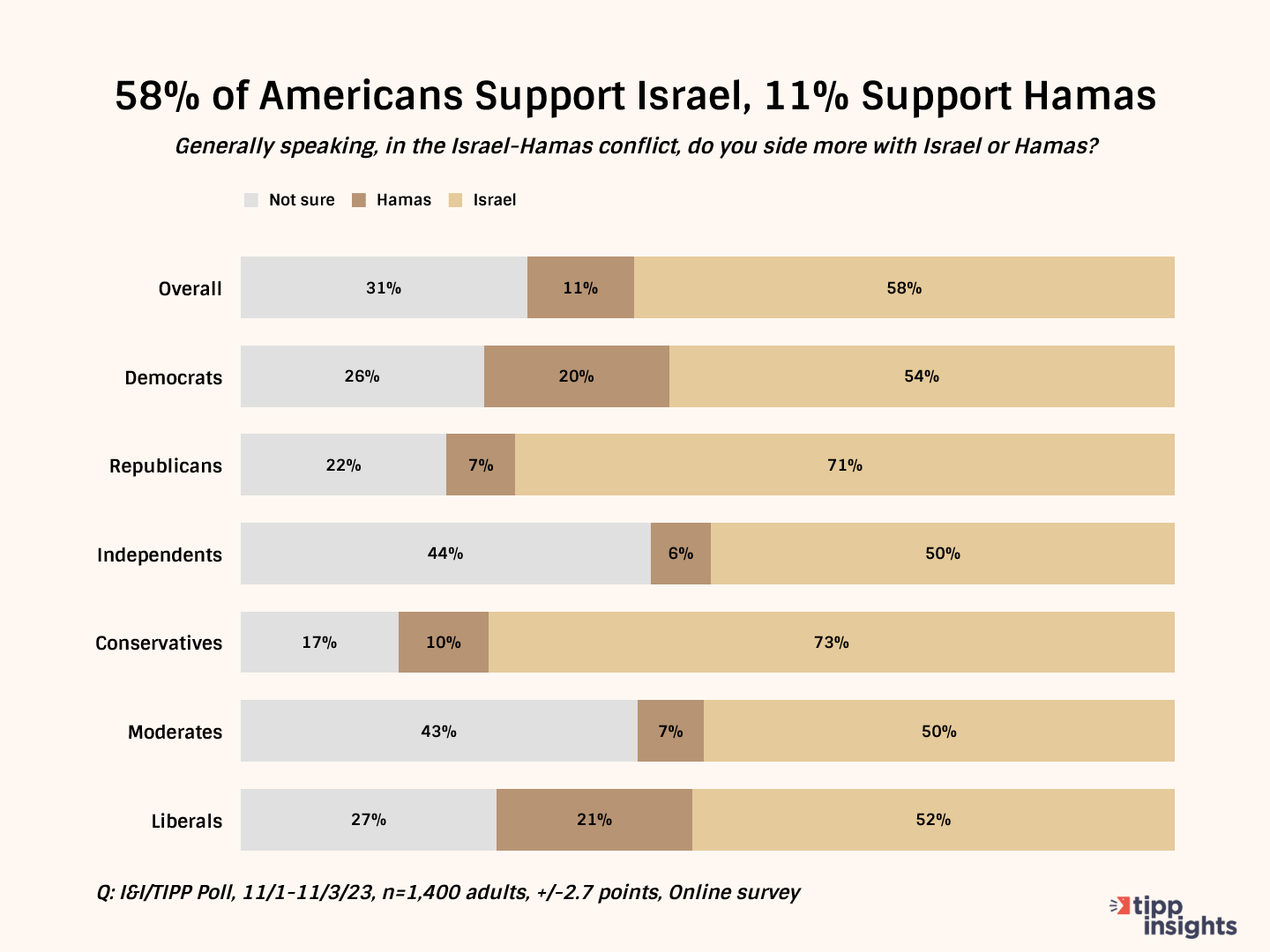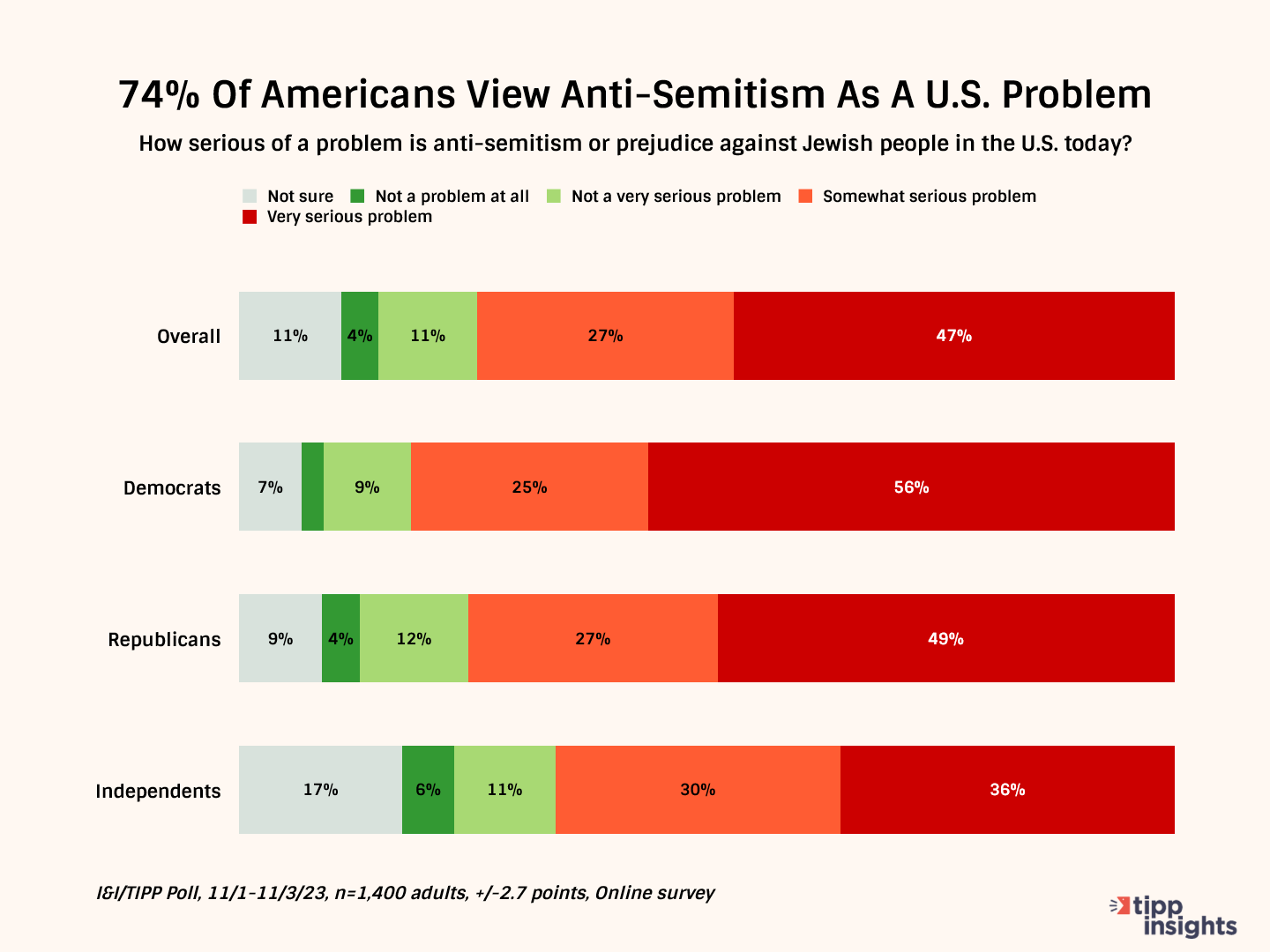When it comes to the Israel-Hamas war, Americans have made a clear choice: a significant majority support Israel, not Hamas, while an even larger majority now call antisemitism a "serious" problem, the latest I&I/TIPP Poll reveals.
But a shockingly high 20% of Democrats say they support Hamas in the current conflict, despite reports of blood-curdling barbarism committed against innocent Israeli men, women, and children. Just over half of Democrats say they support Israel.
Amid the backdrop of the Oct. 7 attacks against Israel by the terrorist group Hamas, I&I/TIPP asked Americans this question: "Generally speaking, in the Israel-Hamas conflict, do you side more with Israel or Hamas?" The national online poll of 1,400 adults was taken from Nov. 1-3, with a margin-of-error of +/-2.7 percentage points.
Of those responding, 58% sided with Israel, while just 11% supported Hamas, which governs the Gaza Strip on Israel's southern border. But there was a big unknown, given the polarizing effect the attack by Hamas (which killed 1,400 mostly civilian noncombatants, including women, children, and babies) had on public opinion: 31% "weren't sure."
The political split was fairly wide, though all three major political groupings in the U.S. supported Israel by 50% or higher. The results include Democrats (54% Israel support, 20% Hamas support, 26% not sure), Republicans (71% Israel support, 7% Hamas support, 22% not sure), and independents (50% Israel support, 6% Hamas support, 44% not sure).

So while Israel can count on support from all parts of the main political spectrum, it's clear that some groups are stronger in their support than others. But Republicans are strongest in their support of Israel in the current war.
Who supports Hamas? Data show a dramatic split by age group. This is significant, since college campuses have been roiled for weeks by pro-Hamas and anti-Israeli demonstrations and violence.
Among those 18-24, essentially the college years for most, just 30% expressed support for Israel, while 17% backed Hamas and 53% responded "not sure." The numbers for those 25-44 were a little higher for both Israel (46%) and Hamas (21%), while considerably lower for "not sure" (33%).
The numbers change dramatically with advancing age.
For those 45-64, 62% support Israel, with just 6% supporting Hamas. "Not sure" was 32%.
Most pro-Israel of all are those over 65. Why? One reason may be that many remember the Six-Day War in 1967, a stunning victory for the tiny country against a coalition of Arab states, followed six years later by a victory in the Yom Kippur war against many of the same nations.
With that as background, the 65-plus crowd supports Israel by 84%, Hamas by just 2%. And only 14% are "not sure." This is significant for 2024, since voter turnout for the oldest contingent in 2020 was largest at 72%, versus 61% overall.
Given the recent upsurge in antisemitic demonstrations and violence around the world, we then asked a related question: "How serious of a problem is anti-Semitism or prejudice against Jewish people in the United States today?"
The answer was clear.
Among participants, 74% called antisemitism and anti-Jewish prejudice either a "very serious" (47%) or a "somewhat serious" (27%) problem. Another 11% termed it not "very serious," while 4% described it as "not a problem at all."
Democrats (82% "serious", 12% "not serious") and Republicans (76% "serious", 16% "not serious") are fairly close in their responses. Independents are a bit apart, with 66% answering "serious" and 17% "not serious."

Further insight can be gained by looking at the self-described ideology of the respondents.
Those who call themselves "liberal" answered 83% "serious," 10% "not serious," and 7% "not sure" when it came to describing the antisemitism problem, while "conservatives" went 81% "serious," 13% "not serious," and 6% not sure. Self-described "moderates" stood at 67% "serious," 17% "not serious," and 16% "not sure."
So, in general, a majority sees antisemitism as a problem, but the strongest sentiment was expressed by conservatives and liberals. Moderates were somewhat less strong and sure in their belief.
These numbers may have major ramifications for 2024 and beyond. Americans were genuinely shocked at the sudden attack on Oct. 7 by Hamas against civilians in Israel, an attack that included well-documented brutality against men, women, children and babies of an extreme sort.
As we noted above, while there is a broad majority of voters who side with Israel in its war with Hamas and that also believe there's an antisemitism problem, Democrats in particular have a problem uniting the far-left of their party with the more-mainstream elements over support for Israel.
Violent demonstrations by leftist, pro-Palestinian crowds at the White House, on college campuses and elsewhere around the world. Biden's verbal support for Israel in late October has enraged large numbers of his one-time supporters, leading to a sharp split within his party.
His remarks on Oct. 18 were quite clear:
I come to Israel with a single message: You are not alone. You are not alone. As long as the United States stands — and we will stand forever — we will not let you ever be alone.
Most importantly, the — I know the recent terrorist assault on the people of this nation has left a deep, deep wound.
More than 1,300 innocent Israelis killed, including at least 31 American citizens, by the terrorist group Hamas. Hundreds — hundreds of young people at a music festival of — the festival was for peace — for peace — gunned down as they ran for their lives. Scores of innocents — from infants to elderly grandparents, Israelis and Americans — taken hostage.
Children slaughtered. Babies slaughtered. Entire families massacred. Rape, beheadings, bodies burned alive. Hamas committed atrocities that recall the worst ravages of ISIS, unleashing pure unadulterated evil upon the world.
The concern within the Democratic Party, of course, is that those most angered by Biden's remarks are the same people who make up the ardently left-activist wing of their party. And they, with their strong support of Hamas, Hezbollah, the PLO, and other Mideast anti-Israel groups organized around hatred of Jews, make up what some call the Democratic Party's antisemitic wing.
That includes the so-called "Squad" in Congress, who may soon find themselves facing well-financed pro-Israel opponents in the next election.
Biden and the rest of the Democratic Party now face a dilemma: Continue to support Israel, and risk splitting his party, or back off and risk losing long-time pro-Israel supporters. It will not be easy.
I&I/TIPP publishes timely, unique, and informative data each month on topics of public interest. TIPP’s reputation for polling excellence comes from being the most accurate pollster for the past five presidential elections.
Terry Jones is an editor of Issues & Insights. His four decades of journalism experience include serving as national issues editor, economics editor, and editorial page editor for Investor’s Business Daily.
Want to dig deeper? Download crosstabs from our store for a small fee!
We could use your help. Support our independent journalism with your paid subscription to keep our mission going.









